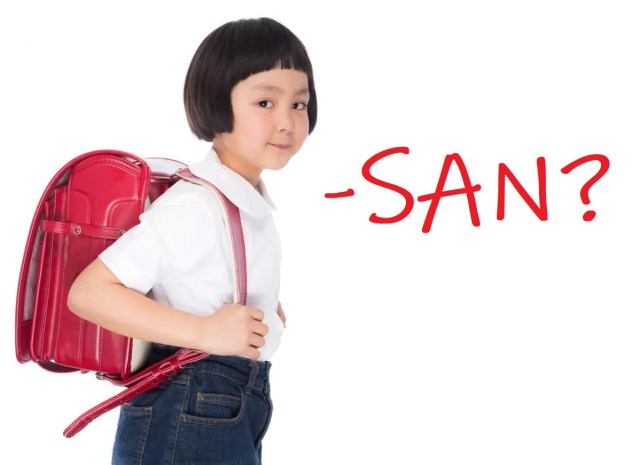
Proper manners, or forcing kids to be too polite?
“-san” is often though of as the Japanese version of “Mr.” or “Ms.” A difference, though, is that -san can also be used with a person’s given name. So, for example, if someone is talking with Yoshio Yamada, they might call him Yamada-san, or they might call him Yoshio-san.
Or they might just call him Yoshio, with no -san at all, or maybe he’s got a nickname, like Yosshi, that people call him by instead.
But at certain elementary schools in Japan, plain Yoshio and Yosshi wouldn’t be options, because some Japanese schools prohibit students from calling each other by nicknames or dropping the -san. There aren’t any official statistics about how widespread such rules are, but one Tokyo public elementary school principal, speaking with the Yomiuri Shimbun newspaper, said he thinks it’s becoming a more common rule at schools in the city.
Tokyo’s Kasai Elementary School, for example, has its teachers instruct students to use -san when talking with their friends. “If you foster a sense of respect for the person they’re talking to from a young age they won’t take actions that hurt others,” says Masaaki Uchino, Kasai Elementary’s 60-year-old principal.
▼ Did this guy spend his formative years not calling his friends with -san?
Advocates of having even children call each other with -san tend to feel that way for two reasons. First, dropping the -san when speaking with someone, a practice called yobisute, can be interpreted in multiple ways. In a positive sense, it can be seen as a sign that there’s no need to stand on stuffy ceremony, and it’s not at all uncommon for especially close friends in Japan to yobisute each other. But on the other hand, since -san is, fundamentally, a polite form of address, dropping it can also be seen as a sign that the person isn’t worthy of respect, especially if the people in the conversation aren’t that close.
Another issue is that, at least among the educators who spoke with Yomiuri Shimbun in favor of mandating the use of -san, there doesn’t seem to be a clear distinction between ordinary nicknames and derogatory ones. “Many nicknames that are based on a person’s physical appearance, or a mistake they made, are insulting,” says Mitsuo Nobuchi, the 51-year-old vice principal at Mito Eiko Elementary, a private school in Ibaraki Prefecture whose conduct rules for students include “Use -san when talking to your friends.” “We don’t believe that rules for how students should address each other will completely stamp out bullying,” admits Nobuchi, “but we do believe it’s a component of deterrent measures.”
However, some believe that forbidding yobisute and nicknames entirely negatively limits their ability to establish their own communication norms with their peers. “By prohibiting nicknames, I worry that they might be making it difficult for children to communicate smoothly and openly with one another,” said a 40-something elementary teacher from Saitama Prefecture. Many Twitter commenters also feel like such rules are going too far, with some citing nicknames as a potentially positive force.
“Such a dumb idea. What’s next? ‘Please call your classmates by their student ID number?’”
“Instead of stopping kids from using nicknames, how about if we stop them from bullying?”
“There are kids who feel embarrassed because their parents gave them a weird, flashy name…but with rules like this, they can’t ask their friends to call them by a nickname instead.”
“There are people whose nickname helped them create an outgoing persona and make friends, and there are people who got saddled with a hurtful nickname they don’t like. It’s pretty complicated.”
“In the third grade, my teacher just had us tell the rest of the class how we wanted them to call us…Worked out great.”
It could be that schools that don’t allow nicknames or yobisute are aware of the benefits that can come from those more casual forms of address, but feel the potential negatives outweigh them. Still, it’d be nice if they could find a way to not throw the baby out with the bathwater, so to speak, in regulating how kids communicate with each other.
Source: Yomiuri Shimbun via Livedoor News, Twitter
Top image: Pakutaso (edited by SoraNews24)
Insert image: Pakutaso
● Want to hear about SoraNews24’s latest articles as soon as they’re published? Follow us on Facebook and Twitter!


 The Japanese language has a special honorific suffix just for talking to athletes
The Japanese language has a special honorific suffix just for talking to athletes Survey finds more than half of Japanese women’s nieces don’t call them “aunt”
Survey finds more than half of Japanese women’s nieces don’t call them “aunt” 11 different ways to say “father” in Japanese
11 different ways to say “father” in Japanese Petition to allow students to choose what they wear to school gathers almost 19,000 signatures
Petition to allow students to choose what they wear to school gathers almost 19,000 signatures Former schoolgirl sues Tokyo high school that made her drop out for breaking no-dating rule
Former schoolgirl sues Tokyo high school that made her drop out for breaking no-dating rule Red light district sushi restaurant in Tokyo shows us just how wrong we were about it
Red light district sushi restaurant in Tokyo shows us just how wrong we were about it Tokyo Tsukiji fish market site to be redeveloped with 50,000-seat stadium, hotel, shopping center
Tokyo Tsukiji fish market site to be redeveloped with 50,000-seat stadium, hotel, shopping center McDonald’s new Happy Meals offer up cute and practical Sanrio lifestyle goods
McDonald’s new Happy Meals offer up cute and practical Sanrio lifestyle goods Japanese ramen restaurants under pressure from new yen banknotes
Japanese ramen restaurants under pressure from new yen banknotes Historical figures get manga makeovers from artists of Spy x Family, My Hero Academia and more
Historical figures get manga makeovers from artists of Spy x Family, My Hero Academia and more Akihabara pop-up shop sells goods made by Japanese prison inmates
Akihabara pop-up shop sells goods made by Japanese prison inmates Limited-edition Carbonara Udon will anger noodle purists and pasta lovers 【Taste test】
Limited-edition Carbonara Udon will anger noodle purists and pasta lovers 【Taste test】 Sandwiches fit for a sumo served up in Osaka【Taste Test】
Sandwiches fit for a sumo served up in Osaka【Taste Test】 Pokémon Sleep camping suite and guestrooms coming to Tokyo Hyatt along with giant Snorlax burgers
Pokémon Sleep camping suite and guestrooms coming to Tokyo Hyatt along with giant Snorlax burgers Beautiful Red and Blue Star luxury trains set to be Japan’s new Hokkaido travel stars
Beautiful Red and Blue Star luxury trains set to be Japan’s new Hokkaido travel stars All-you-can-drink Starbucks and amazing views part of Tokyo’s new 170 meter-high sky lounge
All-you-can-drink Starbucks and amazing views part of Tokyo’s new 170 meter-high sky lounge More foreign tourists than ever before in history visited Japan last month
More foreign tourists than ever before in history visited Japan last month French Fries Bread in Tokyo’s Shibuya becomes a hit on social media
French Fries Bread in Tokyo’s Shibuya becomes a hit on social media Studio Ghibli releases new action figures featuring Nausicaä of the Valley of the Wind characters
Studio Ghibli releases new action figures featuring Nausicaä of the Valley of the Wind characters New private rooms on Tokaido Shinkansen change the way we travel from Tokyo to Kyoto
New private rooms on Tokaido Shinkansen change the way we travel from Tokyo to Kyoto Starbucks reopens at Shibuya Scramble Crossing with new look and design concept
Starbucks reopens at Shibuya Scramble Crossing with new look and design concept Studio Ghibli glasses cases let anime characters keep an eye on your spectacles
Studio Ghibli glasses cases let anime characters keep an eye on your spectacles Beautiful Ghibli sealing wax kits let you create accessories and elegant letter decorations【Pics】
Beautiful Ghibli sealing wax kits let you create accessories and elegant letter decorations【Pics】 Studio Ghibli releases Kiki’s Delivery Service chocolate cake pouches in Japan
Studio Ghibli releases Kiki’s Delivery Service chocolate cake pouches in Japan New definition of “Japanese whiskey” goes into effect to prevent fakes from fooling overseas buyers
New definition of “Japanese whiskey” goes into effect to prevent fakes from fooling overseas buyers Our Japanese reporter visits Costco in the U.S., finds super American and very Japanese things
Our Japanese reporter visits Costco in the U.S., finds super American and very Japanese things Studio Ghibli unveils Mother’s Day gift set that captures the love in My Neighbour Totoro
Studio Ghibli unveils Mother’s Day gift set that captures the love in My Neighbour Totoro New Japanese KitKat flavour stars Sanrio characters, including Hello Kitty
New Japanese KitKat flavour stars Sanrio characters, including Hello Kitty New Pokémon cakes let you eat your way through Pikachu and all the Eevee evolutions
New Pokémon cakes let you eat your way through Pikachu and all the Eevee evolutions Disney princesses get official manga makeovers for Manga Princess Cafe opening in Tokyo
Disney princesses get official manga makeovers for Manga Princess Cafe opening in Tokyo Sales of Japan’s most convenient train ticket/shopping payment cards suspended indefinitely
Sales of Japan’s most convenient train ticket/shopping payment cards suspended indefinitely Sold-out Studio Ghibli desktop humidifiers are back so Totoro can help you through the dry season
Sold-out Studio Ghibli desktop humidifiers are back so Totoro can help you through the dry season Japanese government to make first change to romanization spelling rules since the 1950s
Japanese government to make first change to romanization spelling rules since the 1950s Ghibli founders Toshio Suzuki and Hayao Miyazaki contribute to Japanese whisky Totoro label design
Ghibli founders Toshio Suzuki and Hayao Miyazaki contribute to Japanese whisky Totoro label design Doraemon found buried at sea as scene from 1993 anime becomes real life【Photos】
Doraemon found buried at sea as scene from 1993 anime becomes real life【Photos】 Tokyo’s most famous Starbucks is closed
Tokyo’s most famous Starbucks is closed One Piece characters’ nationalities revealed, but fans have mixed opinions
One Piece characters’ nationalities revealed, but fans have mixed opinions We asked a Uniqlo employee what four things we should buy and their suggestions didn’t disappoint
We asked a Uniqlo employee what four things we should buy and their suggestions didn’t disappoint Princesses, fruits, and blacksmiths: Study reveals the 30 most unusual family names in Japan
Princesses, fruits, and blacksmiths: Study reveals the 30 most unusual family names in Japan Japanese middle school criticized for pulling out girls’ bra straps to check their color
Japanese middle school criticized for pulling out girls’ bra straps to check their color The strange and funny nicknames Chinese netizens have given Western celebrities【Video】
The strange and funny nicknames Chinese netizens have given Western celebrities【Video】 Teacher disciplined for drinking alcohol during class in Japan
Teacher disciplined for drinking alcohol during class in Japan Super Mario movie delayed, Nintendo posts strange apology
Super Mario movie delayed, Nintendo posts strange apology Public schools in Japan’s Saga Prefecture will no longer regulate/check students’ underwear color
Public schools in Japan’s Saga Prefecture will no longer regulate/check students’ underwear color Japanese high school requires teens to kneel and bow for teaches, receives harsh online backlash
Japanese high school requires teens to kneel and bow for teaches, receives harsh online backlash “Peaceful life with many dogs” is unacceptable dream, Japanese high school teacher tells student
“Peaceful life with many dogs” is unacceptable dream, Japanese high school teacher tells student Majority of Nagasaki high schools and middle schools have white-underwear-only rules, study finds
Majority of Nagasaki high schools and middle schools have white-underwear-only rules, study finds Japanese middle school teacher kisses her student at Tokyo Disneyland during date, gets fired
Japanese middle school teacher kisses her student at Tokyo Disneyland during date, gets fired Foreign English teacher in Japan calls student’s ability garbage, says it was an “American joke”
Foreign English teacher in Japan calls student’s ability garbage, says it was an “American joke” Japanese teachers confiscate students’ cell phones following Osaka earthquake, get slammed online
Japanese teachers confiscate students’ cell phones following Osaka earthquake, get slammed online Don’t like trigonometry? Then you’re just like Hitler, says Japanese high school English teacher
Don’t like trigonometry? Then you’re just like Hitler, says Japanese high school English teacher Is Japan overworking its teachers? One exhausted educator says, “YES!”
Is Japan overworking its teachers? One exhausted educator says, “YES!” Japanese teacher beats up student for making fun of his body by calling him anime character name
Japanese teacher beats up student for making fun of his body by calling him anime character name Japan’s Shizuoka bans teachers from personal communication with students on social media
Japan’s Shizuoka bans teachers from personal communication with students on social media
Leave a Reply